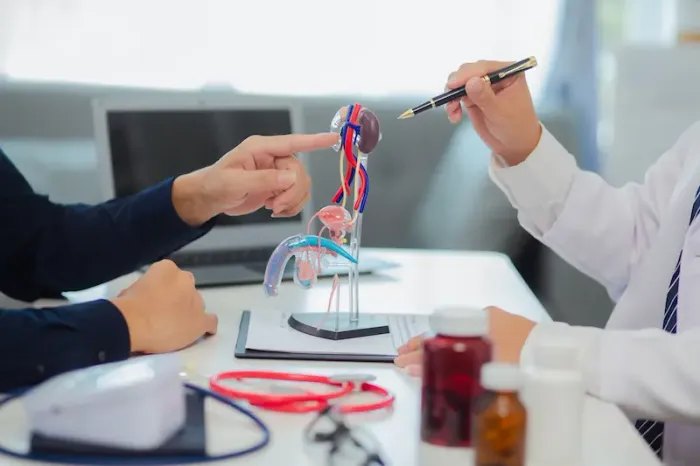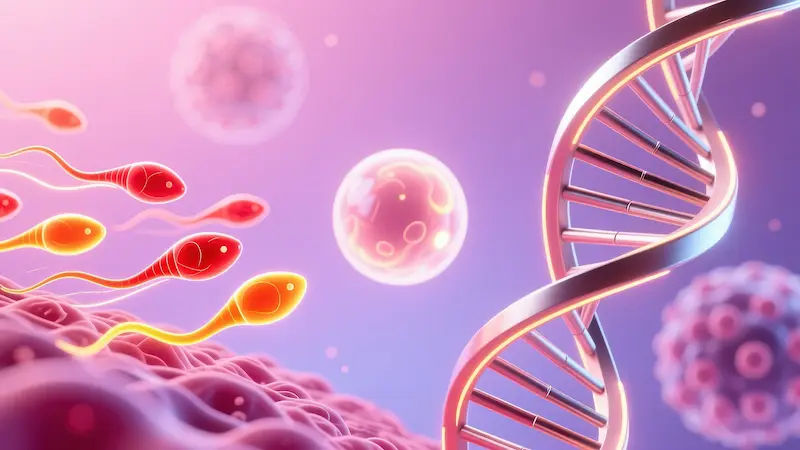The Urologist's Role in Male Infertility
Learn how urologists diagnose and treat male infertility, their role in fertility evaluation, and the treatment options available for couples.


Introduction
When a couple faces challenges conceiving, the focus often initially lands on the female partner. However, male factors are a sole or contributing cause in about 40-50% of infertility cases. This is where a urologist, specifically a sub-specialist known as an andrologist, becomes a pivotal figure. If you're wondering about the role of urologists in treating male infertility, this guide is for you. These medical experts are surgeons who specialise in the male urinary tract and reproductive system, making them uniquely qualified to diagnose and treat the physical conditions that can impact fertility. We will walk you through everything, from knowing when to seek help, what the diagnostic process entails, to the range of medical and surgical male infertility treatments available. Understanding this journey can empower you to take the next step with confidence.
What is a Urologist and Andrologist?
A urologist is a physician who diagnoses and treats conditions of the urinary tract in both men and women, and the male reproductive system. An andrologist is a urologist who has pursued further, specialised training focused exclusively on male reproductive health and sexual function. Think of andrology as the male equivalent of gynaecology. These specialists are experts in conditions like low sperm production, erectile dysfunction affecting conception, and anatomical issues that prevent sperm delivery. They are the primary medical doctors for men in the fertility journey.
Urologist vs. Reproductive Endocrinologist: Who Should You See?
This is a common point of confusion. A Reproductive Endocrinologist (RE) is an OB/GYN who specialises in female infertility and complex assisted reproductive technologies (ART) like IVF. A couple will often see an RE first. However, a sharp RE will always recommend a semen analysis early on. If any abnormality is found, a referral to a urologist/andrologist is the standard of care. The urologist treats the male partner's specific issue, while the RE manages the female partner's treatment and the ART procedures. They work together as a team.
Consult a Urologist for the best advice
When to See a Urologist for Fertility Concerns
The general rule of thumb is to seek evaluation if a couple has been unable to conceive after one year of unprotected intercourse. This timeline shortens to six months if the female partner is over 35, or if there are known risk factors.
Key Indicators and Symptoms
While infertility itself often has no obvious symptoms, certain signs warrant an earlier consultation:
• Known history of testicular injury, surgery, or infection (e.g., mumps orchitis).
• Problems with sexual function (erection or ejaculation difficulties).
• Pain, discomfort, or a lump in the testicular area.
• A history of childhood hernia repairs or undescended testicles.
• A family history of infertility or genetic conditions.
• If a prior semen analysis has come back abnormal.
The Initial Consultation: What to Expect
Your first visit is about gathering a comprehensive picture of your health.
The Detailed Medical and Lifestyle History
Your urologist will ask in-depth questions about your medical history, including childhood development, past surgeries, infections, current medications, and lifestyle factors like smoking, alcohol use, and exposure to toxins. Be prepared to discuss your sexual history and function openly.
The Physical Examination
This is a crucial, hands-on part of the assessment. The urologist will examine the penis and, most importantly, the testicles. They will check for their size, consistency, and presence. A key part is checking for a varicocele, a bundle of enlarged veins in the scrotum that feels like a "bag of worms." This is often more prominent when you are standing.
How Urologists Diagnose Male Infertility
Diagnosis is a multi-step process to pinpoint the exact issue.
The Semen Analysis: The Cornerstone Test
This is the most important test. You will provide a semen sample, which is analysed in a lab for:
• Volume: The amount of semen.
• Sperm Count: The concentration of sperm (million/mL).
• Motility: The percentage of sperm that are moving.
• Morphology: The percentage of sperm that are normally shaped.
At least two analyses are usually done for accuracy. If your results are abnormal, a urologist is the best doctor to interpret them.
Advanced Sperm Function Tests
If needed, further tests can check for sperm DNA fragmentation (damaged genetic material) or the presence of antisperm antibodies.
Hormonal Blood Work
Blood tests measure key hormones like Testosterone, FSH, LH, and Prolactin. Imbalances can signal a problem with the pituitary gland or testicular function.
Imaging: Scrotal Ultrasound and Beyond
A scrotal ultrasound is a painless test that uses sound waves to create images of the testicles and surrounding structures. It is excellent for confirming a varicocele, checking for tumours, or identifying obstructions. In some cases, a transrectal ultrasound (TRUS) may be used to look at the prostate and seminal vesicles.
Get Your Health Assessed
Common Male Infertility Conditions Urologists Treat
Discover the most frequent infertility issues in men and how urologists help diagnose and manage them effectively.
Varicocele: The Most Common Reversible Cause
A varicocele is present in about 40% of men with infertility. It raises scrotal temperature, which can impair sperm production and function. Surgical repair (varicocelectomy) can often improve semen parameters.
Obstructive Azoospermia: Blockages in the Sperm Pathway
This condition means no sperm are in the ejaculate due to a blockage (e.g., from prior infection, vasectomy, or congenital absence of the vas deferens). Sperm production is normal. Treatment involves either surgically bypassing the blockage or retrieving sperm directly from the testicle for use in IVF/ICSI.
Non-Obstructive Azoospermia: Production Problems
This is a more challenging condition where the testicles produce very few or no sperm. Causes can be genetic (like Klinefelter syndrome) or hormonal. The most advanced treatment is microTESE (microdissection testicular sperm extraction), a meticulous surgical procedure where a urologist uses an operating microscope to search for pockets of viable sperm.
Hormonal Imbalances and Genetic Issues
Conditions like hypogonadism (low testosterone) can be treated with medication or lifestyle changes. Genetic testing (karyotype, Y-chromosome microdeletion) may be recommended to identify underlying causes.
Treatment Options: From Medication to Microsurgery
Explore the range of treatments for male infertility, from simple medical therapies to advanced surgical procedures.
Lifestyle Modifications and Medication
This is always the first line of defence. Urologists advise on weight loss, quitting smoking, reducing alcohol, and managing stress. Antibiotics can treat infections, and hormone treatments can correct imbalances.
Varicocele Repair (Varicocelectomy)
This outpatient surgery ties off the enlarged veins, allowing blood to flow through healthier pathways. It can lead to significant improvements in sperm count and motility.
Surgical Sperm Retrieval (PESA, TESA, TESE, microTESE)
For men with obstructions or low production, sperm can be retrieved directly from the testicle or epididymis. These techniques (Percutaneous Epididymal Sperm Aspiration, Testicular Sperm Extraction) are often paired with IVF/ICSI. microTESE offers the highest success rates for non-obstructive azoospermia.
Vasectomy Reversal
For men who have had a vasectomy and wish to father children again, a urologist can perform a vasovasostomy or vasoepididymostomy to reconnect the tubes, allowing sperm back into the ejaculate.
Working with an IVF Clinic: A Collaborative Approach
The field of male infertility is highly collaborative. Your urologist will work closely with your partner's RE. The urologist's goal is to optimise the male factor, whether through surgery to improve natural conception odds or by retrieving sperm for the RE to use in an IVF cycle. This team-based approach ensures you get the best possible care from both specialists.
The Emotional Side of Male Infertility
An infertility diagnosis can be a significant emotional blow, often linked to feelings of inadequacy or stress. A good urologist understands this and addresses the psychological impact. Don't hesitate to discuss your feelings. Seeking support from a therapist or joining a support group can be incredibly beneficial for you and your partner during this process.
Conclusion
Navigating a male infertility diagnosis can feel overwhelming, but understanding the critical role of urologists provides a clear path forward. These specialists offer more than just diagnosis; they provide a range of effective male infertility treatments, from lifestyle guidance and medication to advanced microsurgical techniques that can literally find a single sperm needed to create a pregnancy. Remember, seeking help is a sign of strength, not weakness. The collaborative field of urology and reproductive medicine has made tremendous strides, offering hope and solutions to countless couples. If you have concerns about your fertility, taking the first step to consult a urologist is the most powerful action you can take.
Consult a Urologist for the best advice
Consult a Urologist for the best advice

Dr. Prabir Basu
Urologist
19 Years • MBBS, MS General Surgery, DNB Genito-Urinary Surgery
Jodhpur Park
Dr. Prabir Basu urology clinic, Jodhpur Park
(200+ Patients)
Dr. Mohammed Rehan Khan
Urologist
8 Years • MBBS, MS (General Surgery), Mch (Urology)
Barasat
Diab-Eat-Ease, Barasat
Dr Debanga Sarma
Urologist
10 Years • MBBS, MS (GENERAL SURGERY)M.Ch (UROLOGY)
Guwahati
Apollo Clinic Guwahati, Assam, Guwahati
Dr S K Singhanina
Urologist
25 Years • MBBS/MS/DNB AND MCH UROLOGY
Guwahati
Apollo Clinic Guwahati, Assam, Guwahati
Dr P K Bagchi
Urologist
10 Years • MBBS, MS (Gen. Surgery) M. Ch. (Urology)
Guwahati
Apollo Clinic Guwahati, Assam, Guwahati
Consult a Urologist for the best advice

Dr. Prabir Basu
Urologist
19 Years • MBBS, MS General Surgery, DNB Genito-Urinary Surgery
Jodhpur Park
Dr. Prabir Basu urology clinic, Jodhpur Park
(200+ Patients)
Dr. Mohammed Rehan Khan
Urologist
8 Years • MBBS, MS (General Surgery), Mch (Urology)
Barasat
Diab-Eat-Ease, Barasat
Dr Debanga Sarma
Urologist
10 Years • MBBS, MS (GENERAL SURGERY)M.Ch (UROLOGY)
Guwahati
Apollo Clinic Guwahati, Assam, Guwahati
Dr S K Singhanina
Urologist
25 Years • MBBS/MS/DNB AND MCH UROLOGY
Guwahati
Apollo Clinic Guwahati, Assam, Guwahati
Dr P K Bagchi
Urologist
10 Years • MBBS, MS (Gen. Surgery) M. Ch. (Urology)
Guwahati
Apollo Clinic Guwahati, Assam, Guwahati
More articles from Infertility
Frequently Asked Questions
1. What is the success rate of varicocele surgery for improving fertility?
Success rates vary, but studies show that after varicocele repair, about 60-70% of men show improvement in sperm count and motility. Subsequent natural pregnancy rates for couples range from 30% to 50% within the first year after surgery.
2. Can a urologist help if I have a low sperm count due to hormonal issues?
Absolutely. Hormonal imbalances are a common and often treatable cause of low sperm production. A urologist can prescribe medications like Clomiphene Citrate or injectable hormones (hCG, FSH) to stimulate the testes to produce more sperm naturally.
3. Is male infertility treatment covered by insurance?
Coverage varies widely by insurer and plan. Diagnostic visits and treatments for underlying medical conditions (like repairing a varicocele) are more likely to be covered than assisted reproductive technologies (like IVF). It's crucial to check with your insurance provider directly.
4. How long does it take to see results after starting treatment for male infertility?
It takes approximately 3 months to see changes in semen parameters after any treatment because that is the length of the entire sperm production cycle. Patience is key, and follow-up semen analyses are typically done 3-6 months after intervention.
5. What is the difference between a TESE and a microTESE procedure?
Both are surgical sperm retrieval methods. A standard TESE involves removing small pieces of testicular tissue blindly. microTESE is a more advanced technique where a urologist uses an operating microscope to visually identify and dissect out larger, more promising sperm-producing tubules, leading to higher sperm retrieval rates and less tissue removal, especially in cases of non-obstructive azoospermia.





